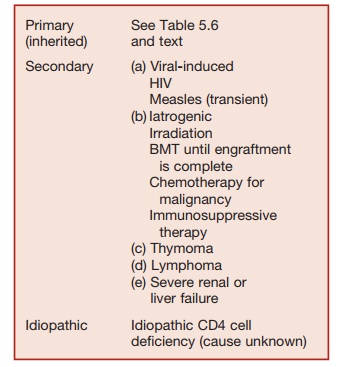Chapter: Essential Clinical Immunology: Immunological Aspects of Immunodeficiency Diseases
Manifestations of T-Cell Deficiency
Manifestations of T-Cell Deficiency
KEY CONCEPTS
Patients with impaired T-cell function may develop the following:
1. They show increased susceptibility to infections with intracellular microbial pathogens (viruses, intracellular bacte-ria, and protozoa).
2. Viral infections: Infections with exan-thematous viruses (measles, chicken pox) can be fatal in children with T-cell deficiency. These viruses are not a problem in adults as they have residual protective antibody responses generated by primary infection or immunization. Adults with T-cell deficiency are typically affected by the reactivation of latent viruses (e.g., cyto-megalovirus, Herpes simplex), which can produce life-threatening disseminated infections.
3. Fungal infections: T-cell-deficient pa-tients are typically susceptible to fungal infections.
a. Pneumocystis giroveci causes intersti-tial pneumonia, which is pathogno-monic for T-cell deficiency;
b. Mucocutaneous infection with Candida;
c. Systemic infections with filamentous fungi (e.g., Aspergillus fumigatus);
d. Meningitis or systemic infection caused by Cryptococcus neoformans.
4. Intracellular bacterial infection is a particular problem in T-cell-deficient patients. These patients are highly
susceptible to infection with M. tuberculosis or reactivation of latent tuberculosis. They are also suscep-tible to disseminated infections with poorly pathogenic mycobacteria (e.g., nontuberculous mycobacteria, BCG).
5. Infants with T-cell deficiency are usually lymphopenic and fail to thrive (i.e., fail to maintain normal rates of growth in height and weight).
6. Infants with SCID may develop der-matitis and hepatosplenomegaly due to graft-versus-host disease caused by maternal lymphocytes that have crossed the placenta.
7. Malignancies: T-cell-deficient indi-viduals are prone to develop a range of malignancies where viral infection acts as a co-factor (e.g., Epstein-Barr virus [EBV-] induced non-Hodgkin’s lymphoma, Kaposi’s sarcoma where human herpes virus 8 is a co-factor). There is also an increase in cutaneous malignancies occurring in an individ-ual exposed to significant amounts of ultraviolet light (basal-cell carcinoma and squamous carcinoma).
Table 5.5 Causes of T-Cell Deficiency

Related Topics